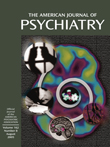Reversal of Symptomatic Hyperprolactinemia by Aripiprazole
To the Editor: Hyperprolactinemia is a well-recognized complication of treatment with antipsychotics, causing multiple endocrine and sexual side effects, including the risk for osteoporosis and possibly breast cancer (1). We report a case of successful treatment of risperidone-induced hyperprolactinemia by the partial dopamine agonist aripiprazole.
Anne was a 17-year-old adolescent diagnosed with schizophrenia complicated by medication noncompliance. She was admitted to the inpatient service while acutely psychotic. She had mild asthma but no other medical problems. Her periods had been normal since menarche. Her maternal grandfather also has schizophrenia but had been asymptomatic for many years while taking haloperidol.
Risperidone was started because of the option for a long-acting formulation. Anne accepted the idea of an intramuscular injection because of her grandfather’s history. Her oral dose was titrated up to 4 mg/day over 2 weeks, after which she received her first injection of 25 mg. She reported a decrease in psychotic symptoms but began to complain of bilateral breast pain, swelling, and galactorrhea. Serum prolactin was drawn and found to be elevated, at 119 μg/ml (normal range 0–25 μg/ml). Aripiprazole (15 mg/day) was added to her drug regimen because of its partial agonism at the dopamine receptor (2), making it a theoretically useful tool in lowering prolactin. Anne remained taking oral risperidone, 4 mg/day, and had a gradual resolution of her breast pain and galactorrhea. Another prolactin level taken 12 days later was 18 μg/ml. Anne was discharged from the hospital much improved while taking a combination of a long-acting intramuscular injection of risperidone, 25 mg every 2 weeks, and aripiprazole, 15 mg/day.
Aripiprazole lowers serum prolactin below placebo when it is used as a single agent (3). To our knowledge, this is the first case report of aripiprazole used in combination with another antipsychotic expressly to treat symptomatic hyperprolactinemia. Risperidone causes more marked elevations in prolactin than other atypical antipsychotics because it does not fully cross the blood-brain barrier (4). Dopamine D2 receptor occupancy is therefore higher at the level of the pituitary than in the striatum. Aripiprazole has a greater affinity for the D2 receptor than risperidone, with central D2 receptor occupancy around 90% at a dose of 15 mg/day (5). The partial agonist property of this compound means that in the presence of dopamine hypoactivity, as induced by risperidone, aripiprazole will function as a dopamine agonist with roughly 30% intrinsic activity at postsynaptic receptors (5), restoring tonic inhibition to anterior pituitary lactotrophs. Spontaneous prolactin decline in this case would be unlikely because the time since risperidone exposure was short. However, normalization after longer-term treatment (1 year) has been reported (6).
It may be advantageous to avoid the use of directly acting dopaminergic agents in psychotic patients because of the risk for worsening psychosis. Whether this risk is really any lower for aripiprazole when combined with a direct D2 receptor antagonist is not clear and would need to be answered in a controlled trial.
1. Wang PS, Walker AM, Tsuang MT, Orav EJ, Glynn RJ, Levin R, Avorn J: Dopamine antagonists and the development of breast cancer. Arch Gen Psychiatry 2002; 59:1147–1154Crossref, Medline, Google Scholar
2. Kane JM, Carson WH, Saha A, McQuade RD, Ingenito G, Zimbroff DL, Ali MW: Efficacy and safety of aripiprazole and haloperidol versus placebo in patients with schizophrenia and schizoaffective disorder. J Clin Psychiatry 2002; 63:763–771Crossref, Medline, Google Scholar
3. Keck PE Jr, Marcus R, Tourkodimitris S, Ali M, Liebeskind A, Saha A, Ingenito G (Aripiprazole Study Group): A placebo-controlled, double-blind study of the efficacy and safety of aripiprazole in patients with acute bipolar mania. Am J Psychiatry 2003; 160:1651–1658Link, Google Scholar
4. Kapur S, Langlois X, Vinken P, Megens AA, De Coster R, Andrews JS: The differential effects of atypical antipsychotics on prolactin elevation are explained by their differential blood-brain barrier disposition: a pharmacological analysis in rats. J Pharmacol Exp Ther 2002; 302:1129–1134Crossref, Medline, Google Scholar
5. Grunder G, Carlsson A, Wong DF: Mechanism of new antipsychotic medications: occupancy is not just antagonism. Arch Gen Psychiatry 2003; 60:974–977Crossref, Medline, Google Scholar
6. Findling RL, Kusumakar V, Daneman D, Moshang T, De Smedt G, Binder C: Prolactin levels during long-term risperidone treatment in children and adolescents. J Clin Psychiatry 2003; 64:1362–1369Crossref, Medline, Google Scholar



